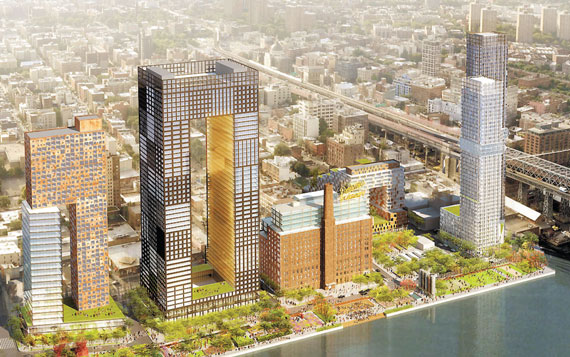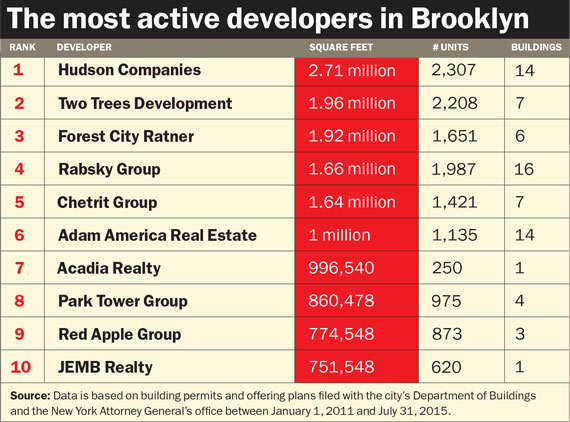Take a good look at the Brooklyn skyline, because what you see won’t be there for long.
Fueled by a frothy economy and unrelenting demand, developers hit the gas on residential projects over the past 18 months.
Overall, Brooklyn development topped 41.6 million square feet— second only to Manhattan — spanning nearly 600 projects and 45,359 apartments, according to The Real Deal’s analysis of building permits and offering plans filed between Jan. 1, 2011 and July 31, 2015.
Notably, a massive 85 percent of those plans were submitted since January 2013. Since that time, developers initiated plans for 35.3 million square feet, 534 projects and 38,375 residential units, TRD found.
Hudson Companies dominated the borough’s list of the most prolific developers by square footage. The firm filed plans for just over 2.71 million square feet since 2011, including 2,307 units spread over 14 projects. The largest, Gowanus Green, is a planned mixed-income village on 5.8 acres in Gowanus, which Hudson is developing with partners Bluestone Organization, the Fifth Avenue Committee and Jonathan Rose Companies. Plans call for eight towers totaling 790,000 square feet with 774 rental and condo units.
Meanwhile, David and Jed Walentas’ Two Trees Management, the developers behind the $1.5 billion redevelopment of the old Domino Sugar refinery in Williamsburg, clocked in at No. 2 with just over 1.96 million square feet across seven projects with more than 2,200 total units.
Forest City Ratner — which is partnering with the Chinese firm Greenland USA to develop Pacific Park — came in close behind, with roughly 1.92 million square feet, including 1,651 units.
Simon Dushinsky’s Rabsky Group took the No. 4 spot with more than 1.66 million square feet and 1,987 units, followed by the Chetrit Group, with 1.64 million square feet and 1,421 units. Like many of their competitors, those two firms ramped up their activity in the last two years.
In fact, 13 out of Rabsky’s 16 projects were announced in 2013 or later.
“In Downtown Brooklyn and Boerum Hill, you walk down the street and you see so many holes in the ground compared to 12, 18 months ago,” said Andrew Sasson, a director at Eastern Consolidated. “It’s not just residential; there are hotels coming up and office projects, as well.”
The next wave
Although it might seem like Brooklyn’s building boom has been in effect for a while, it is expected to jump to the next level in the coming years.
A recent report by residential brokerage City Realty said that residential development in Brooklyn will hit a 10-year high in 2016, with about 5,000 new apartments hitting the market — up from 2,700 this year.
Roughly 22,000 new apartments are slated to come online in the next four years, according to City Realty’s tally. The largest concentration will be in Downtown Brooklyn, (6,400 units), followed by Williamsburg (4,300 units) and Greenpoint (3,008 units).
By and large, the residential development scene is still dominated by rentals.
A TRD analysis of building permits earlier this year found that just 8 percent of Brooklyn’s pipeline — some 1,900 units — are planned condos. Another 17,600, meanwhile, will be rentals. (TRD’s tally is slightly higher than City Realty’s because the brokerage only looked at projects planned through 2019 and it excluded smaller buildings and rental-to-condo conversions.)
“There’s a tremendous amount of rental development and a lot in the pipeline,” said Andy Gerringer, managing director of new development at the Marketing Directors, which is working on several projects in
the borough.
Prices for development sites — which in prime neighborhoods are around $350 to $400 per foot — are rising. And industry players are predicting an uptick in condo development in the next two to three years as developers are priced out of the rental market and look to capitalize on high demand from buyers.
Indeed, the number of new Brooklyn condos is set to double next year, from just under 1,500 this year to more than 2,600 in 2016, according to Corcoran Sunshine Marketing Group. (By comparison, 6,000 new condos are slated to hit the Manhattan market in 2016.)
Hudson Companies, for one, is developing a 36-story condo at Cadman Plaza West and Clinton Street, over a new branch of the Brooklyn Public Library. The project will house 139 apartments, many of them larger two- and three-bedroom units. “There’s a huge need for that,” said CEO David Kramer. “It will retain value down the road.”
Meanwhile, Kushner Cos., along with LIVWRK and the Rockpoint Group, is converting 338 rentals at Williamsburg’s 184 Kent Avenue into condos.
Of course, Brooklyn sales and rental prices already break records routinely. The average sales price hit a record $788,529 during the second quarter, up more than 17 percent in a two-year period, according to data from real estate appraisal firm Miller Samuel. On the rental side, the median rent in July rose 4.1 percent to $2,968 — a mere $450 below Manhattan.
New high-end condo projects are, of course, commanding even higher prices.
At the 278-unit condo 550 Vanderbilt, located at Pacific Park, units are priced between $550,000 and $5.5 million. Prices at the project are averaging nearly $1,400 per square foot, according to StreetEasy.
But at the highest echelon of the market, some developers are commanding $2,000 per square foot — a price more typical
of Manhattan.
Andrew Sasson, Eastern Consolidated
For example, at 51 Jay Street in Dumbo, Adam America Real Estate and Slate Property Group sold a $4.3 million penthouse for $2,065 per foot. Meanwhile, 1 John Street in Dumbo, 388 Bridge Street in Downtown Brooklyn, Pierhouse in Dumbo and 210 Pacific in Boerum Hill are all in the same general range.
Beyond prime Brooklyn neighborhoods, Sasson said developers are “chasing deals” in Gowanus, and even deeper in the borough.
“Unless you start pushing the boundaries, it’s harder to make the rental work [financially],” said Gerringer.
Hudson’s Kramer said that when he began developing in 1986, it was pioneering to be in Dumbo. “Now, we keep taking subway stations further and further from Manhattan,” he said. “When those neighborhoods become very expensive, we’re trying to figure out where to go next.”
Lately, Hudson has bet big on Prospect Lefferts Gardens, where it has three large projects. The largest, which will measure roughly 230,000 square feet, is at 626 Flatbush Avenue. The 80/20 project will house 254 rentals. “We expect by charging lower rents than buildings in prime neighborhoods, we’ll be successful,” said Kramer.
Mega names, mega projects
Brooklyn’s development rush is captivating both longtime Brooklyn players and those who jumped into the game during the recession.
For example, No. 6-ranked Adam America, which was founded in 2010, now has more than 1 million square feet in development, comprised of 14 buildings with 1,135 residential units.

A rendering of the $1.5 billion redevelopment of the old Domino Sugar refinery
Meanwhile, Brookland Capital, co-founded by Boaz Gilad and Assaf Fitoussi, weathered the recession and has more than 35 developments with upwards of 445 units, according to TRD research. (With more than 465,000 square feet under development, the firm didn’t make the cut for TRD’s official ranking.)
Several Manhattan real estate families are also aggressively looking for projects in Brooklyn , even if they did not make TRD’s list.
For example, Spitzer Enterprises exploded onto the scene last year when the company bought a 2.8-acre Williamsburg site for $165 million. Led by Eliot Spitzer, New York’s former governor, the firm is developing three towers with 856 rental units.
Gary Barnett’s Extell Development also jumped into the mix this spring when it bought the last development site at City Point, the 1.8 million-square-foot, $1 billion project in Downtown Brooklyn. Extell plans to build a 500-unit tower at 128 Willoughby Street, although official plans haven’t been filed.
Meanwhile, Michael Stern’s JDS and developer Joseph Chetrit are reportedly mulling a 1,000- to 1,200-foot residential tower in Downtown Brooklyn. The duo is paying $90 million for the former Dime Savings Bank of New York at 9 DeKalb Avenue, which has 300,000 square feet of development rights. And they already own the adjacent site, at 340 Flatbush, giving them a combined 600,000 square feet of development rights.
Like mega projects throughout the city, Brooklyn’s biggest projects have either been years in the making, or were locked in when prices were lower.
“Jobs are much larger than they were a couple of years ago because the money is there,” said David Maundrell, founder of aptsandlofts.com, which is marketing a number of projects in the borough.
Two Trees, for example, acquired the 11-acre Domino site in 2012 for $185 million, and over the past two years has demolished 27 buildings and cleared the site for excavation.
“We bought Domino at a really great time. Today, you could imagine that same site trading for more than twice what we paid,” said David Lombino, Two Trees’ director of special projects.
Two Trees officially broke ground on the first of four towers earlier this year. At nearly 500,000 square feet, the 16-story tower will house 500 rental units, including 105 affordable units. In all, Two Trees plans to develop 4 million square feet at the Domino site. “We’ll be developing there for years to come,” Lombino said.

